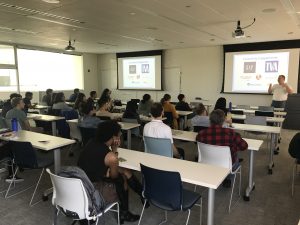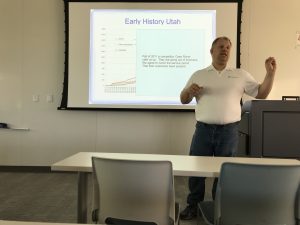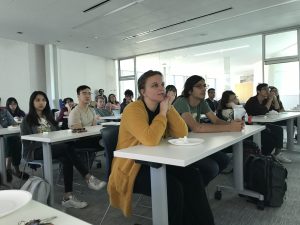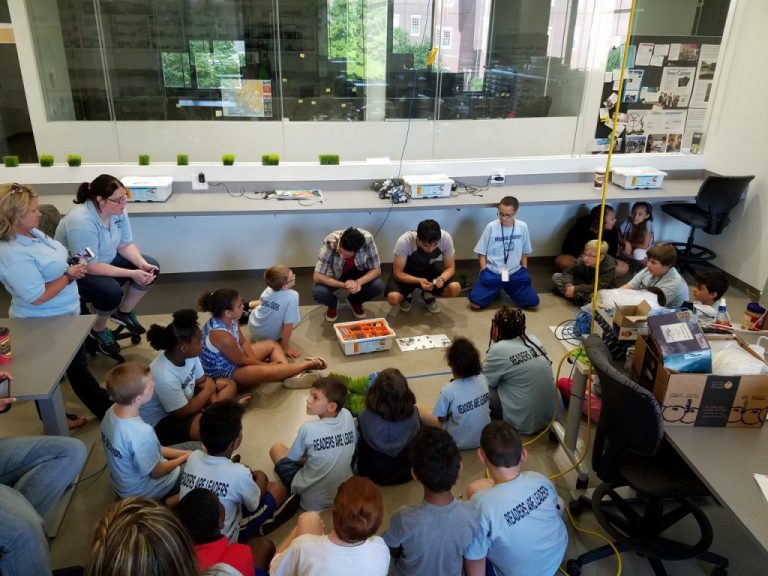Eric Eastman ‘96 is a local CS-Entrepreneur. He heads the Multi-Million dollar company Green Filing — a firm that electronically automates and facilitates legal case paperwork in Utah, California, Texas, Illinois, Indiana, and Maryland. In the past, he contributed extensive software development expertise to Doxpop, The Gap Inc., Netjets Aviation, and several other companies large “label” companies. After developing legal filing software as a pet project in 2009, Eastman took to the Market and expanded his work to cover business, strategy, and furthering the cutting edge.

Eric spoke extensively about what it meant to make his interstate organization. In particular, he mentioned being struck with his idea, working on it as a personal software challenge for a few years, and of course eventually taking it public alongside his partner George Knecht in 2009. Utah eventually mandated E-Filing for law firms, and his quality product and sneaky, “we are actually almost all of your e-filing options,” business strategy caused him over 60% of Utah’s E-Filing market share. One thing led to another, and soon, Green Filing was known in over 5 states for its quality service and products.

Eric did also come to speak towards CS interest. He mentioned key details pertaining to an undergoing AWS->GCP migration for his cloud based software and NLP integration into their website. Since Green Filing is moving from AWS to GCP, GCP, which is more computationally and rigorously tailored than AWS, is better suited to Green Filing’s needs. GCP also offers strong integration with NLP websites and scaling, making it a point of fixation within the DevOps environment for customer-centric organizations. In layman’s terms, learning GCP is lucrative, as companies are welcoming it.
Lastly, Eastman spoke about Earlham’s influence on his career. Eastman mentioned pursuing the “CS Hermit welled up in a room with fluorescent lights solving hard problems” for his early career in undergrad. Taking the gen-Ed’s exposed him to the further soft skills he needed to actually get negotiations, interactions, and customer relations highly professional and well greased. He attributes much of his professional success to the Earlham soft skill enrichment he received as part of his Computer Science BA, and explicitly noted that he is “a big supporter of BA’s in technical fields because of the soft sciences one gets” during the program. That is to say his Earlham degree caused him enormous success.

On a personal take level, I quite enjoyed hearing highlights of Eric Eastman’s story. I’m also someone who, at some point or another, pictured himself welled up in a fluorescent room solving hard problems, and while to some degree I still do, people like Eric remind me to take gen-Ed’s seriously and enrich my soft skills in a deliberate practice. Hearing the story about Eric’s journey from pet project to multi-state organization inspired me. That story particularly showed that work done for various reasons outside of professionalism has potential to scale and alerted me to the recording process of my own self-proclaimed “million dollar ideas” as potential works to be done in hobby time. Lastly, I found the whole “persistence brings breakaways” model for doing things to be inspirational. Eastman’s Utah project went underway “eventually,” which was in fact a long time with minimal success. I found that believing in an idea enough to jump for it, then supporting it deliberately, will eventually bring about long-standing success. This is certainly another example of just that happening in a story told before our eyes.
By Joseph Islam

